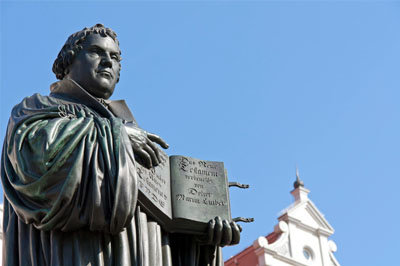Anniversaries are important, especially centennial and bicentennial anniversaries, but a quincentennial anniversary is most notable. We are coming up on a quincentennial anniversary on Halloween, or All Saints Day.
 A statue of Martin Luther stands in Wittenberg, Germany. GETTY IMAGES
A statue of Martin Luther stands in Wittenberg, Germany. GETTY IMAGESOn Oct. 31, 1517 Martin Luther, the German Reformer, tacked his 95 Theses (Disputation on the Power and Efficacy of indulgences) to the door of the Schlosskirch (castle church) in Wittenberg and suddenly became the center of public controversy. His theses attacked the Catholic Church’s corrupt practice of selling “indulgences” to absolve or at least reduce the temporal punishment for sin in purgatory.
Indulgences were originally awarded to people who did good deeds, but by the 1500s indulgences were being sold to raise money for the already immensely wealthy Catholic Church. It was indulgences that caused Luther’s break with the Catholic Church and sparked the Protestant Reformation.
While I was a student at Mercer University there were some ambitious students, presumably religion students, who nailed 95 Theses to some door, presumably the door to the Willingham Chapel. The Mercer Theses were a spoof on Luther’s 95 Theses. Consider the following:
Liberalism was rife on the Mercer campus in the 1960s and in the religion classes the German theologians were prominently referenced. When I enrolled at Mercer I had never heard of Friedrich Schleiermacher, Rudolf Bultmann, Paul Tillich, Gunther Bornkahm, Emil Brunner, and the Niebuhr brothers, Richard and Reinhold (who were born in America, but the sons of German immigrants).
Here are more of Mercer’s 95 Theses:
The demythologizing and neo-orthodoxy of these liberal theologians challenged my faith, but my strict biblical upbringing gave me the foundation to withstand the heresies introduced in those early years of my collegiate experience. Martin Luther became a hero because of his steadfast faith and willingness to confront the errant theology of the Catholic Church in his day.
Luther was willing to exalt the exclusivity of salvation through Christ alone in his Theses. He called for repentance, faith, cross-bearing, and denounced papal authority and indulgences.
Mercer’s Theses were satirical and frivolous. Consider:
Luther, on the other hand, was beleaguered and reviled by the Pope, the bishops, and at times the heads of state all over Europe. But, he maintained, “I am tied by the Scriptures.”
Before the Diet (assembly) of Worms (city in Germany) was dissolved, Charles V ordered an edict to be drawn up, declaring that Martin Luther should submit to the sentence of the pope, be looked upon as a member separated from the Church (excommunicated), a schismatic, and an obstinate and notorious heretic. Before a decision could be made to determine Luther’s fate, he disappeared and returned to the Wartburg Castle in Eisenach.
I cannot agree with everything Luther believed and did, but he believed the Bible is the only source of divinely inspired revelation from God. He refused to believe that God’s punishment for sin could be purchased with money. He was also convinced eternal life could not be earned by good works, but received only as the free gift of God’s grace through faith in Jesus Christ and His redeeming blood.
His 95 Theses have survived for 500 years. Mercer’s 95 Theses have survived for almost 60 years. Consider five more of them.
Yes, these 95 Theses from Mercer have survived for almost 60 years, but only because I had the imprudent audacity to dig up my 1960 issue of the Mercer Cauldron and conjure them up. It is very likely that no other Mercerian has given them a second thought since they had their momentary flicker of recognition.
However, God bless Martin Luther and his carefully conceived, convictional, nocturnal caper with hammer, nail, and scroll of 95 Theses on All Saints Day. We remember his bold, daring, and faithful stand for truth one-half millennium after the fact. He may have tricked Pope Leo X, but he treated millions of Christians in all the centuries since 1517 with his “Disputation on the Power and Efficacy of Indulgences.”
Earlier, probably April 1521, Luther appeared before Emperor Charles V in defense of his faith and spoke the famous words, “Here I stand: I can do no other. God help me.” Although some argue that while that renowned phrase was not a part of Luther’s defense, he did assert that “his conscience was captive to the Word of God and that he could not go against his conscience.”
Sometimes when preachers stand for righteousness or laymen resist the temptation to compromise their integrity or Christian statesmen lift up the banner for religious liberty, I wonder if it makes much of a difference.
However, I am reminded of the story of the old preacher who was always preaching strong sermons condemning sin and advocating righteousness. A critic accosted him one day and said, “Why do you continue to preach with such fervor and zeal? You aren’t going to change anybody.”
The old preacher responded, “I realize that my preaching may not change the sinners, the delinquents, and the reprobates, but I keep on preaching to let them know where I stand so they won’t change me.”